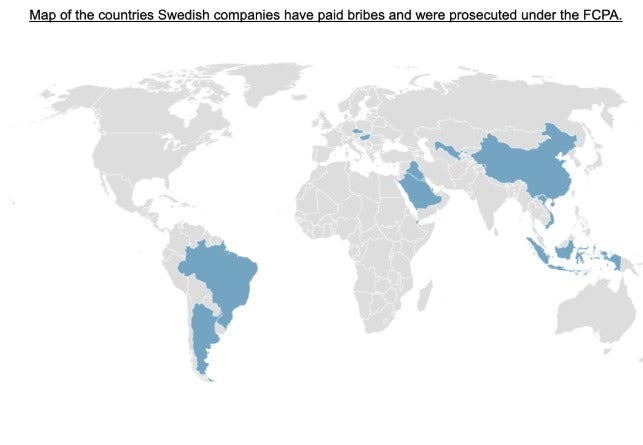In a harsh critique, the Organisation for Economic Co-operation and Development (OECD) has delivered one of its most critical assessments to date in its Türkiye 2024 Phase 4 report, exposing the country’s near-complete failure to combat foreign bribery. The report paints a picture of the numerous significant shortcomings in Turkish anticorruption systems. The OECD examiners found Turkish authorities not only failed to enforce anti-bribery laws but, in some instances, actively intervened to shield bribe recipients.
In the report, the examiners “commend” Türkiye for its efforts only twice, and both in inconsequential sections. By contrast, the examiners express disappointment, regret, or concern in twenty-six sections, with the majority being “seriously” or “extremely” concerned with the state of Turkish anticorruption measures—some of the strongest language in OECD reports.
Lacking Enforcement and Prosecution
Perhaps most egregiously, as highlighted by the report, Turkish anti-foreign bribery measures have not resulted in a single conviction despite “23 known allegations of foreign bribery” in the last twenty-five years. Of these twenty-three allegations, two-thirds were never even investigated. Of the remaining third, the report indicates that there has not been any “proactive or thorough” investigation, and most importantly, no prosecution since the last OECD report. According to the report, there has not been a single instance of someone being held accountable for foreign bribery in Türkiye.
On the prosecution side, besides a severely lacking anticorruption prosecution framework, the report also cites two examples of Turkish government interference in foreign bribery cases. In one of these cases, Turkish government officials had allegedly “received millions of dollars in bribes,” and rather than fight against corruption, the Turkish government fought for it. To derail the case, “Turkish officials at the highest levels reportedly lobbied their foreign counterparts over at least two years,” pressuring the prosecutor, attempting to remove the judge, and engaging in additional interference. In the second example, proceedings based on fifteen “allegations of Turkish companies bribing foreign officials” were stopped by the Turkish government after Turkish officials “conferred” with foreign officials in the affected country.
Unprotected Whistleblowers
In short, despite seventeen years of recommendations to the contrary, whistleblowers are still unprotected in Türkiye. The report states that not only has Türkiye failed to adopt any whistleblower protections, but it has “disregarded” them. The lack of whistleblower protection is cited as a “long-standing concern” in both the public and private sectors, with essentially no progress being made by the Turkish government. An absence of safeguards means an absence of whistleblowers—not a single foreign bribery case has been brought forward via a whistleblower.
Press Censorship, Judiciary Control, and Terrorist-Jacketing
The press plays a crucial role in highlighting bribery and corruption. In Türkiye, the press might as well not exist in this regard. The report notes rampant censorship, with press freedom regressing from its position in the prior Türkiye OECD report. The Turkish government controls 90% of the media. It has imprisoned journalists en masse, with the report citing forty instances of journalists being imprisoned in 2022 alone. Arbitrary press pass denials, fines, intimidation, threats, and actual violence plague the Turkish press, which “hinders the detection of foreign bribery cases” in Türkiye.
However, the situation worsens even further. The report raises numerous critical failings of the judiciary, as the Turkish government had “reformed” (i.e., purged) the judiciary into essentially an executive body with no independence. Prosecutors and judges were “largely suspended, dismissed and detained without sufficient evidence,” with a common reason being “terrorist” labelling by the Turkish government. In essence, a member of the judiciary who opposed the executive status quo was at risk of removal or imprisonment, sometimes without evidence or due process. Clearly, this would have negative ramifications for corruption enforcement. However, such ramifications go even further. The Turkish government blamed the investigation of a 2013 corruption scandal and a 2016 coup attempt on “FETÖ,” a term categorizing followers of a political rival as terrorists. Claims of fighting terrorism, however dubious, have allowed Türkiye, according to the report, to justify cracking down on anticorruption efforts, especially in the judiciary. As such, the message the Turkish government sends is clear: Anticorruption efforts will be treated as “adherence to FETÖ.”
The OECD was not persuaded by Türkiye’s “justifications.” Türkiye suggests that such reforms were to avoid the politicization of the judiciary. In reality, such reforms allowed for the politicization of the judiciary, but in a way that served the executive status quo. Therefore, it is wholly unsurprising that Türkiye lags so far behind in foreign bribery prosecution—the prosecution serves the interests of those taking or benefiting from the bribes.
No Enforcement but the FCPA

According to the report, Türkiye has only prosecuted two of the twenty-three foreign bribery allegations, with zero successful prosecutions. On the other hand, the US has successfully enacted twenty enforcement actions involving Turkish industries’ transnational bribery via the FCPA. Such enforcement actions have led to over $1.7 billion in sanctions, with two actions against Siemens Aktiengesellschaft resulting in just under $800 million in sanctions combined. In comparison, an action against the Telia Company resulted in a $457 million sanction. For reference, on the Turkish side of enforcement and subsequent sanctions, there are none: “There are no statistics on sanctions imposed for foreign bribery because of a lack of enforcement.”
The OECD highlights numerous additional and severe failings of Turkish anticorruption efforts, from an acute lack of awareness of foreign bribery to a lack of training and expertise among prosecutors to an absolute lack of a national anti-foreign bribery strategy. In short, there are essentially no effective measures to combat foreign bribery in Türkiye. If anything, the instances in the report of Turkish government interference against enforcement indicate a continual need for external anticorruption enforcement against Turkish entities. The Turkish government has branded anticorruption efforts as terrorism. It has censored the press and controlled the judiciary to ensure such claims cannot be properly challenged. To Türkiye, the OECD recommendations from the prior phase appear to be just that—recommendations without meaningful change. After all, those who benefit from ineffective anticorruption are unlikely to bolster its effectiveness.




 />i
/>i

